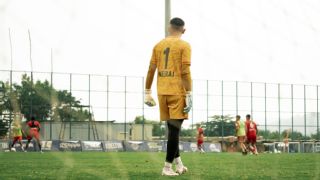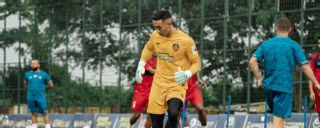|
Dheeraj Singh Moirangthem is just 23, but he's already had a remarkable career: starting goalkeeper for India at the 2017 under-17 FIFA World Cup; first Indian to be named in the official AFC Champions League team of the season; keeping goal for India at the recent Asian Games. He records these moments, and other highs, on his Instagram feed. Four days ago, though, there was a very different image, a very different message: Dheeraj holding a placard where the message essentially was, Save Manipur. For five months and eleven days, Manipur - home state to Dheeraj and many other big names in the Indian football system - has been the scene of unprecedented violence. Official figures put the death toll at 175 and nearly 5000 houses burned down; but that was a month ago, and they are conservative numbers. According to the news portal The Wire, more than 70,000 people have been displaced from their homes and are currently in refugee camps. It's a major humanitarian crisis, and there's no end in sight. Almost as bad, and this is the crux of Dheeraj's message, the crisis has slipped out of the front pages of the national papers and out of the conversation in TV channels. "It's not normal," says Dheeraj, who's speaking to ESPN a few hours before he attends his club FC Goa's daily training session. "I can't imagine the things that are happening back at home. It's so difficult to keep our focus, to concentrate on whatever I'm doing here. It's [true] for all the people -- students, employees -- who are staying away from their family... it's not a normal feeling. You never know what's going to happen in the next moment. And it's been five months." "It's quite difficult when you see [what's happening]. Look at Sana's [Chinglensana Singh, Hyderabad FC and India centre-back] situation - his house was burned down, he was called up for the national team and he dropped off because he was not in the right mental space... in whatever we do, [we need mental peace, first]." Chinglensana comes from Churchandpur, the epicenter of the violence that broke out on the evening of May 2. Along with his house, the football turf he'd built for the youth in his village was destroyed too. Dheeraj says it was Salam Ranjan Singh, another fellow footballer, who gave Sana and his family shelter at his home. "His family is still there," says Dheeraj. Sana was in China, representing India at the Asiad alongside Dheeraj, and they - and the other Manipuri players in the squad -- made it a point to gather together and talk about it every day. "Everyone is [at a loss on what to do]. We have been seeking help for the last four-five months, we really need help to solve this problem." Dheeraj comes from Moirang, a village that borders Churchandpur. His parents have gone out every day, every night, guarding their house, guarding their village. "It's happening across Manipur, for both the communities. When you think about it, 'kisi ka kisi ka bacha toh hoga hi' (they are all somebody's children)." "I was there in the last week of May, I could literally see from my building burning houses, I could hear gunshots everyday in the morning, in the evening. It's not normal..." Dheeraj, a Meitei, studied in Churchandpur, a Kuki-dominated area. he cannot comprehend what's come of it all in less than a decade. "One year back, we hosted our first international football game in Imphal," says Dheeraj. "After that, we hosted Miss India. When those things were happening, I used to feel proud. But now the situation..." There's a feeling of helplessness in his voice. He wants to do something, desperately, but what? So, he speaks. Hoping someone's listening. "I am not talking in a political way," says Dheeraj. "I am a sportsperson, but at the end of the day, I am a human being. I have my family, my relatives, my friends. If I have the opportunity, a platform where I can express what's happening, I will definitely do it. It's my responsibility to raise my voice to seek attention from the government or any other persons." "It's been five months." This is a number he repeats often. "I always thought ki achha ho jayega, accha ho jayega (it'll get better) but, it's getting worse and worse..."  "Even in the past few days I have seen a lot of attention [being given to] what's happening in the Israel-Palestine conflict. Of course, I am not against [those who speak up on that conflict], my heart goes out to everyone who is suffering anywhere, but we shouldn't forget our own state of Manipur." Having played for India just last fortnight, Dheeraj makes a simple appeal, "While we are representing our nation, please make us feel our families are safe back home." He appeals to the powers that be at the Union government to help come up with a solution. He's not taking sides, or justifying anyone. He simply wants everyone to gather around a table and talk it out. "I am talking about both the communities, it's very important to stand up and accept things and take responsibility," says Dheeraj. As much as the present scares him, though, his greatest fears are when he thinks of what lies ahead. "Violence is not the solution to any problem," says Dheeraj. "It spreads hatred, and I don't know how long this hatred will stay within ourselves. For sure this younger generation will carry this hatred for the rest of their lives if we don't solve this problem as soon as possible." "Many people have been affected and traumatized by these events," he says. "So, I don't know how we're going to heal this, how we're going to come back after facing so much. The younger generation... it's going to affect their mentality in a different way. It's really bad, and it's really sad." For now, all he can do is buckle down and get on with his job. "I have to do my job," says Dheeraj. "I can't give excuses or anything but at the end of the day when I come back to my room..." He takes a long pause here, collecting himself. "When I see the videos and the violence going on, it's really ridiculous, the extent to which this has escalated. It's really difficult, it's really difficult." "I just want to ask two questions," he says. "Are we happy with the situation in Manipur? No. Do we really want peace brought back in Manipur? Yes, of course. Then, there must be a solution."
|

